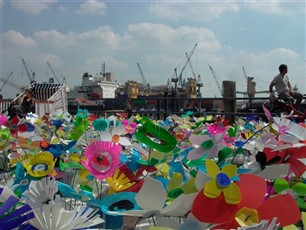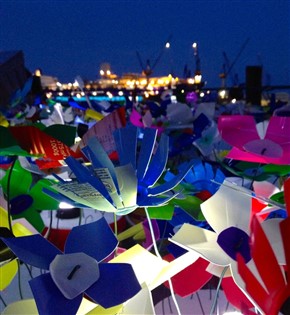

Harbour 2013
A city like Hamburg accrues thousands of tons of plastic waste every day. “But what happens to all the colourful packaging, that was made from expensive resources in the first place ?“ As an artist Katrin Hattenhauer pondered this question and concludes “some of it is being recycled but plenty of it ends up in our oceans. Albatrosses, dolphins and wales mistake the waste for food. They feel full but starve to death, their stomachs full of plastic.”
Hattenhauer decided to transform this waste into a sign of beauty by means of a laborious project that would call attention to one of the biggest problems of our time. This is something to experience. What we need is multiple change. Its against human nature to try and sell everything with the old established patterns while the creative probabilities open up entirely different dimensions. We are speaking of conscious communication with and in between a totality of media that constitutes our picture of the world. Whatever we use as a means to an end only, will come to turn against our initial interest: life.

'Rubbish Meadow at night'
Katrin Hattenhauer's installation delivers its message within a situational aesthetic – at the Fischmarkt and directly next to the river Elbe – it shows that vitality starts with ourselves. Although we use many things only for a limited amount of time – shampoo bottles and all sorts of plastic packaging for cleaners alike – we produce them in a way that makes them last forever. Even longer than it would appear from the very product. But many of the things that we throw away overhasty could have or find new meaning. Their value is not always obvious.
The climate scientist Mojib Latif knows that everyone needs less than he thinks he needs. Status symbols hold no value in themselves. “We need to adjust our coordinates, away from illusory worlds towards real value.” - From partially precious facsimiles of an artificial reality back to a contemplative perception of the real world. UNO Representative Helen Clark said it is no longer sufficient to define our standard of living only in relation to our GDP: “in future environment, equality, and equalisation need to be included.”
Holger E. Dunckel for Sueddeutsche Online (translation Richard Roewer)